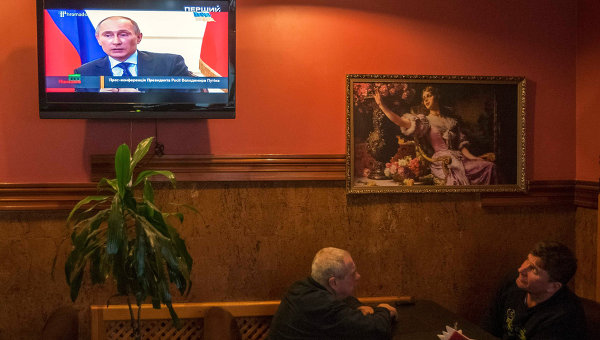
It has been some time since the rehearsal of the opening ceremony to the Olympic Games was shown to the Russian audience by Rossiya 1, as a last-minute attempt to whitewash any shortcomings of the real event. More recently, one of the western neighbouring countries of Ukraine was presented to be Czechoslovakia by the American MSNBC. Apart from evoking feelings of nostalgia, or more likely confusion, in those few Czechs and Slovaks that follow American Media, these two supposedly unrelated cases suggest how the truth is portrayed in the media. However, in case of the current situation in Ukraine, the bets are much higher. This “game of facts and interpretations” is especially dominant in two contrasting Media movements; the pro-Russian and pro-Western. The Russia Today, state-owned Russian English-language news channel, represents the former while the representative of the pro-American can be the CNN. These two media outlets seem not to be able to find a common ground on neither the legitimacy of the Ukrainian government, nor the authenticity of the Crimean referendum, while the Western European bastions of journalism such as the BBC, at least attempt to maintain the middle ground in the coverage of this international crisis.
Firstly, CNN and Russia Today have not been able to agree on finding the right adjective to describe the transitional Ukrainian government. CNN has mostly stuck to the term “new government”, which largely avoids any large questions concerning its legitimacy. In contrast however, Russia Today has creatively adapted the description of a “coup-imposed government”, which clearly underlines the unconstitutional overthrow of Yanukovych’s regime in Kiev. CNN and Russia Today have also expressed contrasting views on the legitimacy of the Crimean referendum. While the latter argues in its article, “Putin: Crimeans expressed their will in full accordance with international law”, exactly what the title suggests, the CNN´s article, “Crimea´s vote: Was it legal?”, counter by saying that it was against the constitution of Ukraine. However, neither of them completely ignores the opposite argument. Instead, they show favour of one extreme viewpoint so that the unaware reader would “swallow the bait” of prescriptive statements. The audience in the both cases could enter the debate with a feeling of objectivity but is indirectly encouraged towards one perspective. In the pro-Western article, this is mostly manifested with a suggestion of the manipulation in the referendum voting. Naturally, this scenario was rejected by Russia Today. However, this cannot be seen as a complete surprise since the latter openly claims to be bringing “the Russian view on global news”.
On the other hand, a more favourable attempt of finding a middle ground can be seen in BBC. In particular, two of their articles, “Analysis: Why Russia´s Crimea move fails legal test” and “Ukraine Crisis: Does Russia have a case?” follow the right direction. The former is an analysis of the Russian intervention from the perspective of the international law by Marc Weller, Professor of International Law at the University of Cambridge, while the latter is trying to look at the Crimea crisis from the perspective of Kremlin. Furthermore, the article, “Is Crimea´s referendum legal?”, discusses the legitimacy of the referendum in the same spirit. Even though neither of them is a pro-Russian article, which no one can expect them to be, they seem to be at least solid attempts for objectivity.
The moral we should take from the following variations on truth is that neither the current crisis in Ukraine nor the perspective of the Media that write about can be considered de facto one-sided. Both CNN and Russia Today are guilty of trying to present a subjective version of events regarding Ukraine and Crimea, instead of trying to find establish an objective medium. However, it is important to emphasise that none of them was necessarily lying. No one expects them to be purely factual on the expense of the readability and domestic constraints, although that by itself is not an excuse to remain highly interpretive at the expense of the journalistic content. The balance was generally achieved in the pieces by BBC mentioned above. Consequently, what is presented in the media lies mostly somewhere between the lie and the truth, therefore when trying to make a picture not just about the current situation in Ukraine, it is always essential to consult a variety of sources, while at the same time remaining vigilant and critical.
words by Jakub Csabay
Lost in facts or interpretations?

0 Comments
